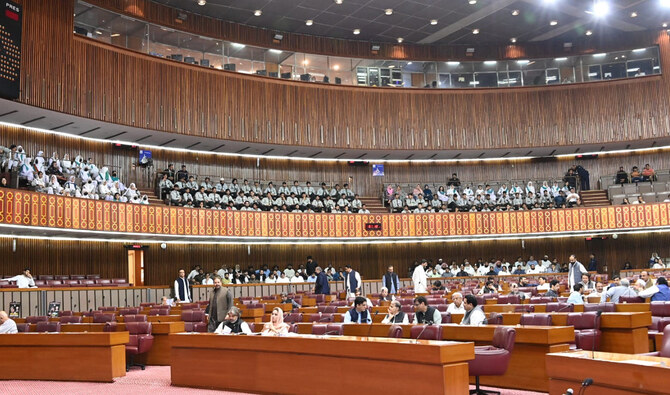ISLAMABAD: The Supreme Court of Pakistan on Saturday censured the election regulatory authority for its “dilatory tactics” to avoid the implementation of a judgment on reserved seats for women and minorities in the national and provincial legislatures that favored the opposition Pakistan Tehreek-e-Insaf (PTI) party, warning of potential consequences.
The court has addressed the issue through a short order at a time when Prime Minister Shehbaz Sharif’s coalition government is planning to get a constitutional amendment passed from parliament to allegedly give an extended term to the country’s top judge. The amendment requires two-third majority in both houses of parliament, though the coalition can lose a portion of its existing number of seats after the apex court ruling.
In a verdict on July 12, a 13-member bench of the court declared the PTI of Pakistan’s jailed former Prime Minister Imran Khan eligible for the reserved seats after the Election Commission of Pakistan (ECP) forced the party’s candidates to contest the February 8 polls as independents.
The ECP took the decision after the PTI lost its election symbol in the wake of a prolonged legal battle for not holding proper intra-party polls. Subsequently, the election body refused the reserved seats to the PTI on technical grounds, saying they were only meant for political parties instead of independent candidates.
The Supreme Court overturned the ECP decision, saying it had misconstrued an earlier verdict related to the election symbol by depriving the PTI of the reserved seats. Instead of giving the seats to the party, however, the election body filed a petition, seeking guidance on the matter and questioning the validity of the party’s organizational structure under the circumstances.
“The clarification sought by the Commission [ECP] … is nothing more than a contrived device and the adoption of dilatory tactics, adopted to delay, defeat and obstruct implementation of the decision of the court,” read the court’s four-page order.
“The attempt by the Commission to confuse and cloud what is otherwise absolutely clear as a matter of the Constitution and the law must therefore be strongly deprecated,” it added.
The government and its allies are currently struggling to complete the required two-third majority for the constitutional amendment allegedly to revisit the length of the top judge’s tenure.
As per the official tally, it is short of at least 13 lawmakers in the National Assembly and nine in the Senate to gain the required number.
In recent days, the top government leaders have tried to complete the numerical strength by wooing opposition parties like the Jamiat Ulema-e-Islam of Maulana Fazlur Rehman and some PTI lawmakers who are yet to be declared members of the party due to the delayed implementation by the ECP of the Supreme Court judgment.
The four-page Supreme Court order may serve as a setback to these efforts since it recognizes the PTI-backed independent candidates “members of the parliamentary party of PTI in the National Assembly and Provincial Assemblies concerned, for all constitutional and legal purposes.”
“The continued failure of, and refusal by, the [ECP] to perform this legally binding obligation [of implementing the July verdict] may, as noted, have consequences,” the order said.
“This obligation must be discharged forthwith,” it added.
Speaking to Arab News, Abdul Moiz Jaferii, a legal expert, described the order without ambiguity.
“This is a clear order from the Supreme Court that all returned independent candidates of the PTI are deemed to be PTI lawmakers,” he said.
“The election commission is now left with no choice but to notify all independent returned candidates as lawmakers of the PTI forthwith,” he added. “The top court has censured the ECP for delaying the implementation, but now one can hope that this issue will come to a logical conclusion within days with allocation of the reserved seats to the PTI.”
















